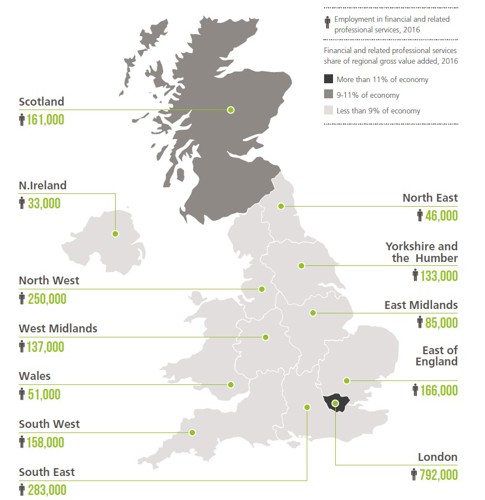I was very pleased to launch our 2018 ‘Enabling growth across the UK report’ in Leeds earlier this month. The latest edition of our annual report quantifying the contribution of financial and related professional services to employment and GVA in each of the UK’s regions and nations observes, among other things, that between 2015 and 2016, the North West saw the largest rise in percentage terms in industry employment. The industry’s spread across the UK is summarised in this image:
Employment and gross value added in financial and related professional services, 2016

Source: Office for National Statistics, Nomis and TheCityUK estimates
Speaking in Leeds, I explained some of the ways in which the policy recommendations in the report reinforce our economic analysis, and vice-versa. One example of the ways in which data and analysis could—and arguably should—inform policymaking is in the area of economic specialisation. Several of our latest recommendations focus on the further development of specialist financial and related professional services centres. Meanwhile, recent analysis from the ONS shows a positive correlation between relatively fast-growing UK sub-regions and more specialised UK sub-regions.
In short, the data show that faster growing UK sub-regions are typically more specialised, relative to economic structure in the UK as a whole. Of course, it’s hardly surprising to see a link between specialisation and growth—it makes intuitive sense that greater specialisation would lead to higher efficiency and productivity, which in turn lead to higher (long-run) growth. And the ONS research from which I’ve taken this chart notes that “There is a vast literature on growth explaining the theoretical arguments and presenting empirical evidence that differences in specialisation patterns can then affect growth rate across areas owing to the existence of differences in the growth potential of each sector”.
To explore this UK sub-regional specialisation further, the ONS undertook location quotient (LQ) analysis, which is a method of assessing the relative concentration of particular industries in particular areas, relative to the industry concentrations in the country as a whole. We used the ONS data to examine specialisation in the “knowledge-intensive services and high tech services” sector, which includes knowledge-intensive financial services along with high-tech knowledge-intensive services and knowledge-intensive market services. Our analysis shows that of the 40 UK sub-regions, only four had a high or moderately high level of relative specialisation in knowledge-intensive and high-tech services in 2016. Another 13 sub-regions were around the average UK level of specialisation in this sector.
This analysis shows how much scope there is for UK regions and sub-regions to continue to develop their specialist capabilities in a productive, knowledge-intensive sector like financial services—and how doing so is likely to facilitate faster growth. And the policy recommendations in our latest report offer suggestions for enhancing the contribution of the financial economy to the real economy—the theme of this blog.

